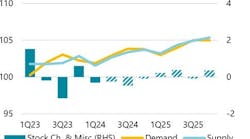Ann de Rouffignac
OGJ Online
HOUSTON, Dec. 5 -- Texas lawmakers and regulators concluded the state electricity market is ready for retail competition as scheduled on Jan. 1 during a Wednesday hearing in Austin.
But if the market doesn't develop over the next year or two as anticipated, the legislature will have to go back to the drawing board, said Rep. Steve Wolens, (D-Dallas). Retailers, however, expressed concern profit margins will not be high enough to attract enough companies to make the market competitive.
The Electric Utility Restructuring Legislative Oversight Committee held a joint hearing with the Public Utility Commission to review final preparations by the Electricity Reliability Council of Texas, the grid operator, and to quiz retail competitors about plans to participate.
"All systems are go for Jan. 1 for the competitive market," Wolens said. Max Yzaguirre, chairman of the PUC, agreed that he didn't see any "show stoppers." But the PUC has still scheduled open meetings for Dec. 19 and 28 for final check ups.
"The trends are all good. I am optimistic that the system will be functioning smoothly," said Yzaguirre. "It's a cautionary green light."
Retailers also agreed the grid operator has largely overcome problems with switching customers to new suppliers that dogged the deregulation pilot. Many retailers complained as recently as 3 weeks ago about persistent errors and delays since the pilot program started last summer.
"I'm happy with the trend in ERCOT," said Kathleen Magruder, a representative with retailer NewPower Co., an affiliate of Enron Corp.
However, retailers complained about the prospect for low profit margins when the market opens in January. Retailers have to offer electricity at a price below a PUC-approved so-called price-to-beat. That rate is supposed to be 6% below average electricity rates in effect Jan. 1999, adjusted for fuel costs.
All Texas electricity customers are supposed to get the price-to-beat, if they don't do any shopping for electricity and simply stay with the incumbent utilities' affiliated retailer. If consumers shop around, the idea is they could save even more money. This basic proposition of the deregulated retail market came under discussion at the hearing.
"We have great concern about the headroom (profits) in the market. We need a vibrant market that will raise interest by consumers in switching," said Paul Thomas, chief operating officer of Green Mountain Energy Co. Thomas said the price-to-beat is too low and he is "very concerned" a competitive market will not develop, if it isn't raised. Magruder blamed poor participation by other companies in the residential market on a low price-to-beat.
"We are concerned because there are only two marketers that target residential customers," she said.
Price-to-beat dilemma
Consumer activists said the purpose of deregulation was not to keep electricity prices high so every inefficient competitor could enter the market and make a profit. "They are asking the PUC to keep prices high so their business plans will work," said Janee Briesemeister, senior policy analyst with Consumers Union.
She said the price-to-beat shouldn't be manipulated by the PUC to boost retailers' profits. Reliant Energy Inc. would not have agreed to set the price-to-beat too low for the company to make a profit, she said. If Reliant Energy can make money on the price-to-beat, then New Power should be able to cover its costs and make a profit, she said.
"Reliant agreed to the price-to-beat and they don't sell at a loss," Briesemeister said.
Committee members conceded the dilemma. "If the price-to-beat is too low, no one comes into the market and there is no competition. If the price-to-beat is too high, then we reneged on our promise to the consumers," said Rep. Sylvester Turner (D-Houston).
Sen. David Sibley (R-Waco) suggested that if the price of electricity is set artificially high now, consumers will recover the difference in 2 years when an accounting or "true-up" is done. "Won't the windfalls be captured then?" Sibley said.
Wolens said if more companies don't begin offering power, "we will have to go back to the drawing board. I am concerned about the price-to-beat dilemma."

